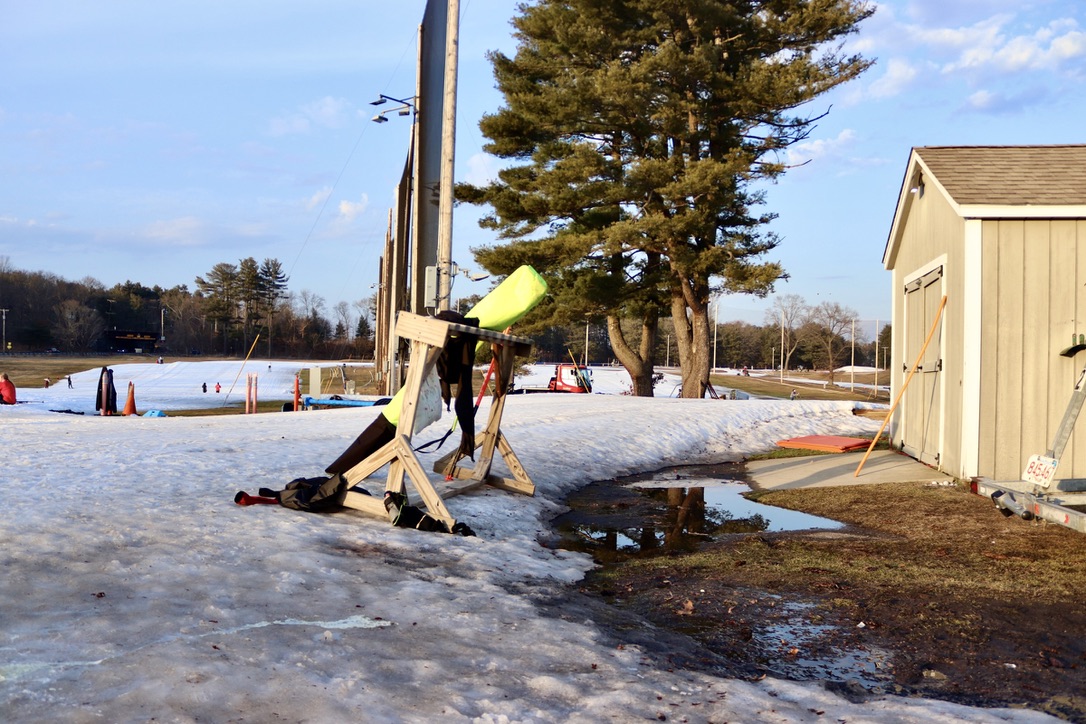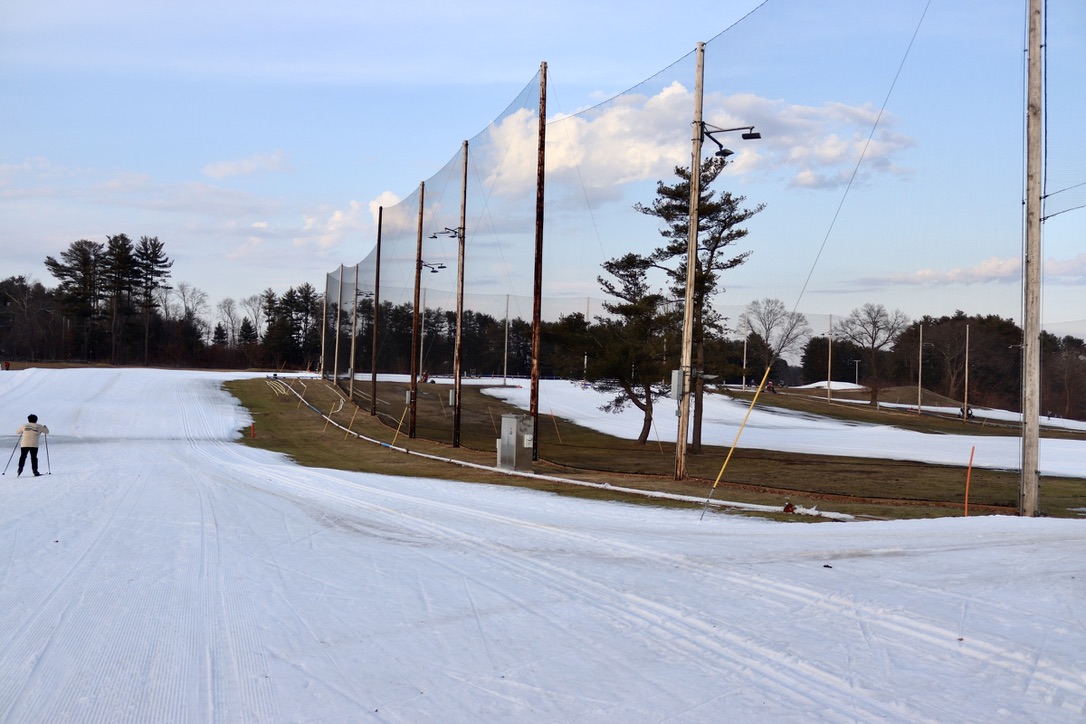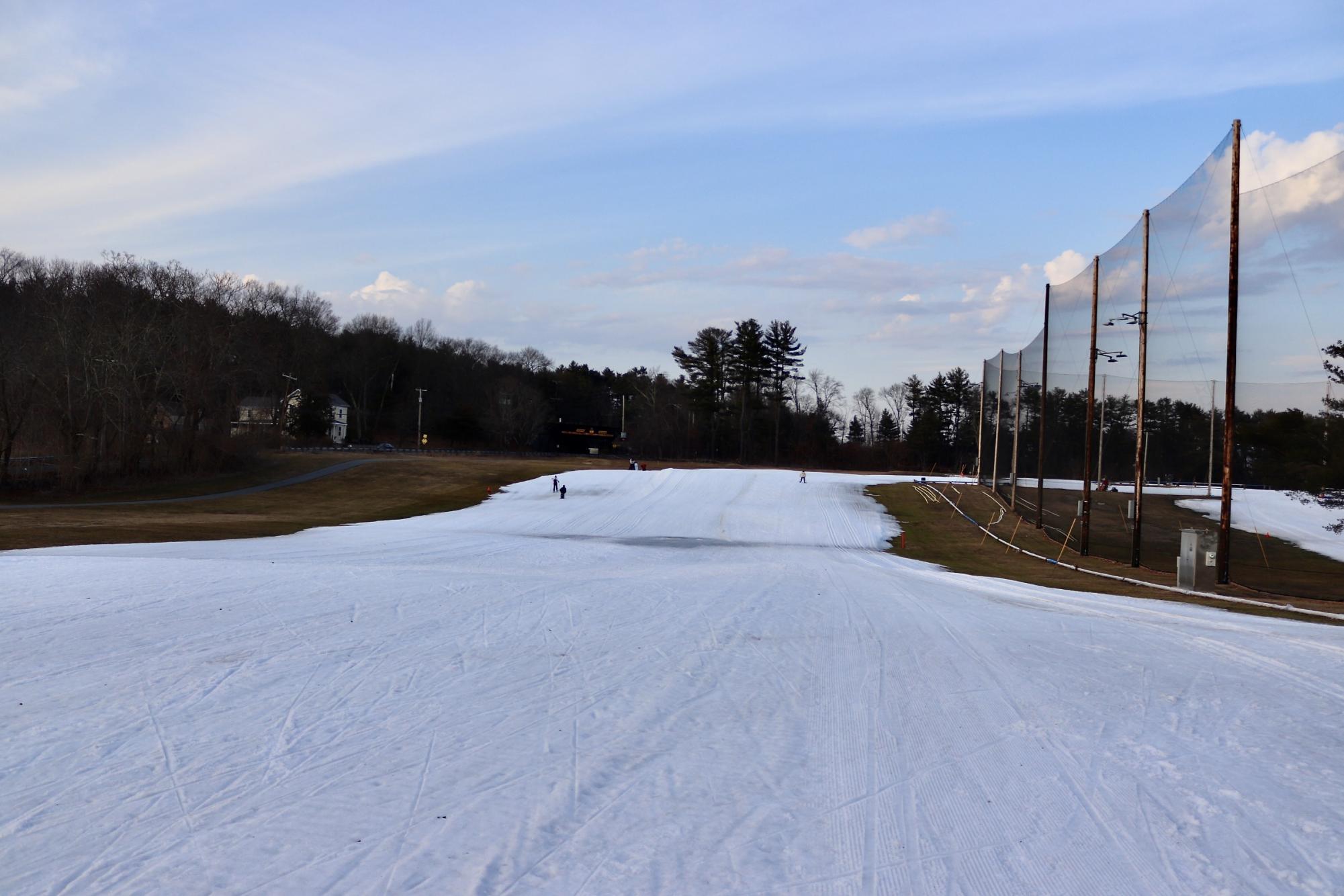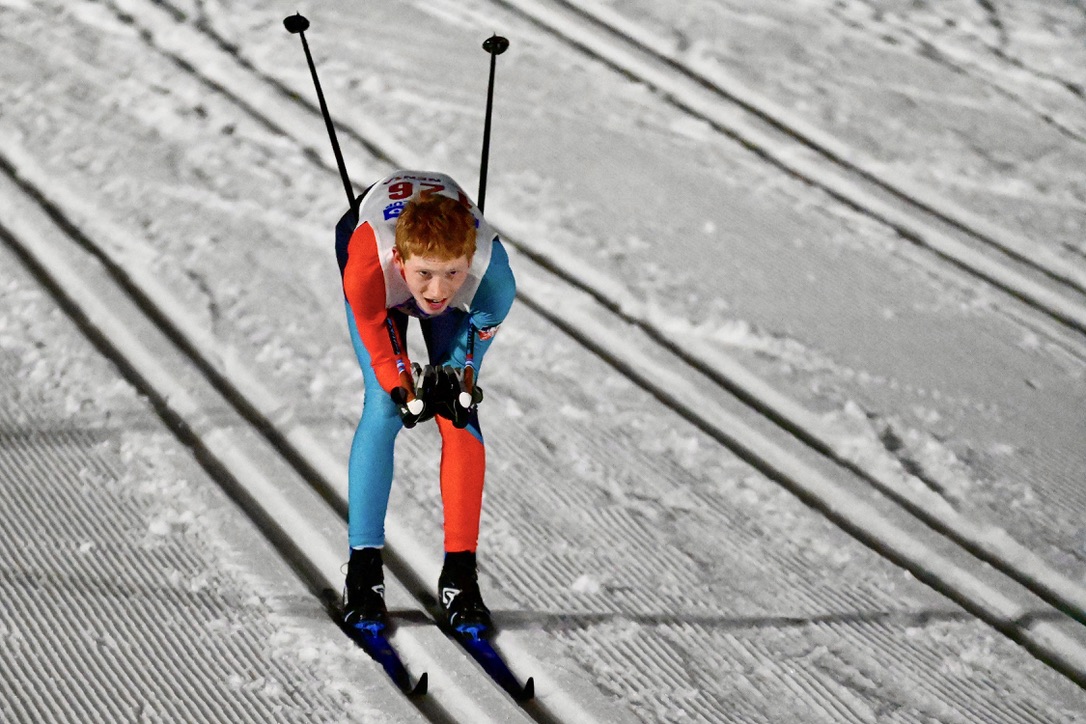
Climate change has been an impending issue across the world, with extreme weather patterns, food shortages and floods dominating landscapes. Experts warn that with more inaction surrounding climate change, an issue that is largely manmade, the effects of emissions will soon be irreversible.
Manifestations of climate change have appeared – now more frequently – in all areas of the world in the form of extreme weather. These incidents tear apart homes, displace families and set back entire communities. Since these incidents are often broadcasted on the news, the effects of climate might seem distant for some, including those living in Wayland. However, this year, some student athletes at Wayland High School got to see how climate change could play a substantial role in their lives.
The WHS Nordic ski team had a snowless season this year. While the venue the team practices and races at, Weston Ski Track, made lots of manmade snow, they ran into problems with the snow machines over the course of the season. For a week in late December, the team was unable to have on-snow practices because the pump for the snow machines broke. The pump uses water from the Charles River to produce snow.
Prior to this year, the Massachusetts Interscholastic Athletic Association (MIAA) required the leagues to have at least four races before the state meet. However, due to the lack of snow this season, there was no minimum race requirement.
“There were times in the middle of the season [where we could not ski] without going up north because there just wasn’t enough snow,” senior Nordic ski team captain and Green Team President Amy McCormack said. “So, we had to do some dry-land practices in the middle of January when we should have had enough snow to ski around.”
Furthermore, the increase in rain caused the snow to melt. While the Massachusetts State Team Qualifier Race for the Eastern High School Championships and the U16 Championships is usually held in Western Massachusetts, the race was moved to Weston this year. At the cross-country skiing venues in Western Massachusetts, there are no snow pumps, so skiers have to rely solely on natural snow.

Though climate change has just started to directly impact the lives of some in the Wayland community, the issue has elicited concern from scientific experts for decades. In the past, the existence of climate change itself was debated. However, as the causes and effects of climate change become increasingly apparent, discourse about the topic has shifted to the role humans have played in the environment’s change. Such has been observed by WHS science teacher Kenneth Rideout, who believes that the seriousness of climate change has played a role in how people try to grapple with the issue.
“An average everyday person who’s not interested in current events and is not scientifically literate, it’s impacting their life in some way,” Rideout said. “So [climate change is] sort of hard to deny, which definitely wasn’t the case in the 80s and 90s when you could put some blinders on and ignore it.”
However as weather patterns begin to pick up in intensity, the situation has become more difficult to ignore. According to Rideout, although some people are now more aware of climate change than they were in the past, their individual efforts to fight climate change are curbed by a sense of “personal despair.”
“The strategy used to be to deny that [climate change] exists, and now there are different strategies to try to keep people from regulating these industries,” Rideout said. One of [the strategies] is to actually implant this idea of personal despair, like, ‘oh, there’s nothing I can do as an individual and so therefore, I am not going to do it.’ That’s a strategy to get you to resign.”

Yet, some students in Wayland and across Massachusetts have not resigned. In fact, they’re just getting started. Green Team, WHS’ climate awareness and advocacy club, has been working to enact practices in Wayland that promote climate justice. From ensuring that students recycle and compost their trash during lunch, to lobbying for climate literacy in schools, members of Green Team can be found all the way from the WHS Commons to the Statehouse.
WHS’ Green Team has been working alongside other climate awareness clubs across the state to pass the Massachusetts Climate Literacy Trust Fund bill, or House Bill 4419. The bill would support “interdisciplinary climate education in the state, prioritizing underserved communities and communities that are disproportionately affected by climate change.” Interdisciplinary education means that students would be learning about climate change across multiple classes at school, something that junior Green Team member Tara Sawrikar believes will provide students with a more comprehensive understanding of the climate, as well as equip them with ways to combat climate change.
“Generally, when people think of climate change and sustainability, they immediately go to science classes and want to implement them there,” Sawrikar said. “While that is very important, it also should be put in other subjects like in English, History and math, too. It can be integrated in a lot of different ways that aren’t just in science classes.”
According to Sawrikar, with the issue of climate change becoming more pressing each day, an interdisciplinary approach to climate change education is necessary to enact substantial climate justice. Though some students at WHS may already be aware of the dangers of climate change, Sawrikar and McCormack agree that an education limited solely to the science of climate change isn’t enough to provide students with the resources needed to take action on the issue. Implementing interdisciplinary climate literacy programs throughout the state, however, could make combating climate change a reality for students.
“[Education through science classes] is something that most schools already have, but we also wanted to teach about new solutions,” McCormack said. “Not just like, ‘turn off the light’ solutions, but solutions that are more impactful, like lobbying for solutions, helping kids with the civics of that and helping people actually advocate for these bills as part of the curriculum.”
For those petitioning for climate policy reform and justice, some experts claim that interdisciplinary climate literacy is a solution of great importance, as being actively exposed to the issues and solutions surrounding climate change can impact students’ daily behaviors. Sawrikar says that the urgency of the issue and the immense impact it has on people around the world only stresses the importance of implementing such a curriculum.
“Climate education is just one of those things that people have to look at,” Sawrikar said. “People won’t always look at the news and really seek out that education, so it’s important that everyone, regardless of interests, has [climate literacy] ingrained in them.”
For Sawrikar, all it took was some exposure to environmental issues during middle school for her to develop a passion for climate change. Sawrikar hopes that with the passage of climate literacy bills in Massachusetts and across the country, other students can also begin their own advocacy campaigns to push for bills that are important to them.
“In eighth grade, what we learned really stuck out to me,” Sawrikar said. “I feel like if more people were exposed to [climate issues] in that way or more often, they would also feel more inclined to make a difference themselves.”
In November, seniors in high school, college students and citizens across the country will be voting in the 2024 Presidential Election. Rideout believes that the youth, who often are the strongest advocates for climate justice, can make substantial progress by exercising their democratic rights.
“The solutions are going to be most likely found in government regulation, which means in a democracy, that’s every citizen’s responsibility,” Rideout said. “Think about the direction you want your city, state or nation to go in [in terms of] climate change. That stuff really matters.”
Your donation will support the student journalists of Wayland High School. Your contribution will allow us to purchase equipment, cover our annual website hosting costs and sponsor admission and traveling costs for the annual JEA journalism convention.





Nachi Sawrikar • Apr 5, 2024 at 4:24 PM
Great article about the impacts of climate change. Climate change is real and the impact in New England is outsized. The reason is our winter weather in the past used to average 30 F and now it is averaging 36 F. Because the average weather is above the freezing point of 32 F, most of the winter precipitation is coming in as a wintry mix and not accumulating snow. We are now seeing Golf clubs like Sandy Burr are staying open year around.